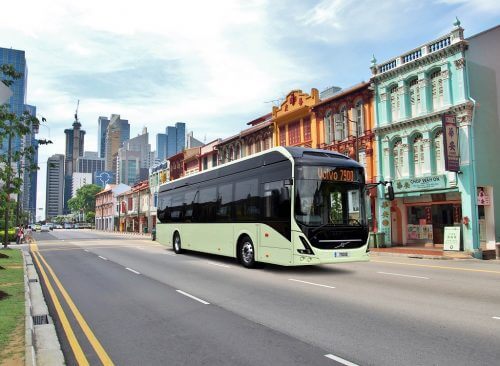
A pair of Volvo 7900s with autonomous technology onboard are to be tested from 2019, with one expected to move around a depot to charge and wash without human interaction
Volvo Buses and Nanyang Technological University (NTU) in Singapore have signed a cooperation agreement on a research and development program for autonomous electric buses.
The program is part of the Land Transport Authority (LTA) of Singapore’s drive to create new sustainable public transport. Singapore has announced that self-driving buses will be deployed in several areas of the country by 2022.
For Volvo this will be its first autonomous application in public transport. The company has already demonstrated autonomous technology in mining, quarry and refuse collection operations.
“We are seeing fast-growing interest in both autonomous and electric vehicles in cities all over the world, said Håkan Agnevall, President of Volvo Buses.
“Together with NTU, one of the world’s leading universities of technology, we now have the possibility of testing various solutions under realistic conditions in a major city that has high ambitions for its public transport.
“We consider Singapore and NTU as excellent partners for Volvo, offering an enabling environment and complete ecosystem of research, development and implementation of new solutions. The technology developed in Singapore can contribute to future autonomous applications by Volvo Buses.”
The program will make use of two electric 12-metre Volvo 7900 single-deckers. Volvo and NTU will build the autonomous driving system on Volvo’s platform.
One of the autonomous electric buses in the program will be used on Singapore’s new test facility for autonomous vehicles, CETRAN (Centre of Excellence for Testing and Research of Autonomous Vehicles) which was inaugurated in November 2017. Here, NTU’s researchers can test new functionality and study how the bus interacts with other road-users in various conditions in a fenced-off area.
The second bus will be used for tests in the bus depot in partnership with the public transport operator SMRT. The aim is the buses should be able to charge their batteries, drive through the depots to the vehicle wash and park entirely autonomously.
NTU President Professor, Subra Suresh, said: “Industry-academic connections are key in nurturing an environment which promotes innovation, research excellence, and technological change for a better tomorrow. NTU takes pride in its strong industry connections, and this partnership with Volvo will pave the way for future mobility solutions by developing and testing autonomous buses right here on campus.
“These solutions will further strengthen Singapore’s vision of embracing autonomous vehicle technologies and enhance public transportation.”
Håkan Agnevall added: “Our electric buses already make it possible for cities to improve their air quality and reduce noise levels. With our system approach to electromobility, we in addition open up new ways for urban planning. When developing autonomous solutions for public transport we can really leverage the Volvo Group expertise in this rapidly developing technology field.”
The cooperative program between Volvo Buses and NTU is now underway and will initially last for two years, with the buses set to arrive in Singapore near the beginning of 2019.
Mr Desmond Kuek, President and Group CEO of SMRT Corporation, said: “Our goal is to stay future-ready by keeping abreast of latest land transport solutions for safe, efficient and comfortable journeys, and adapt such urban mobility solutions to Singapore’s unique operational setting. This MOU paves the way for SMRT, working with our partners, in hosting operational trials for autonomous buses, and the command and control system required for operating such smart vehicles.”
Fast-charging stations based on the common OppCharge interface will be supplied by ABB.

